In the realm of interior design, certain styles transcend the boundaries of time, capturing the hearts of generations with their innate charm and sophistication.Among these,midcentury modern kitchens stand out as beacons of timeless elegance,effortlessly marrying form and function. Characterized by clean lines, organic shapes, and an emphasis on bringing the outdoors in, this aesthetic not only revolutionized household design in the mid-20th century but continues to inspire contemporary spaces today. As we delve into the rich history and enduring appeal of midcentury modern kitchens, we uncover the secrets behind their captivating allure and explore how elements of this celebrated design movement can be seamlessly integrated into todayS culinary havens. Join us on a journey through style and innovation, where nostalgia meets modernity, creating the perfect backdrop for both culinary creativity and cherished memories.
Embracing Minimalism: The Art of Simplicity in Midcentury Modern Kitchen Design
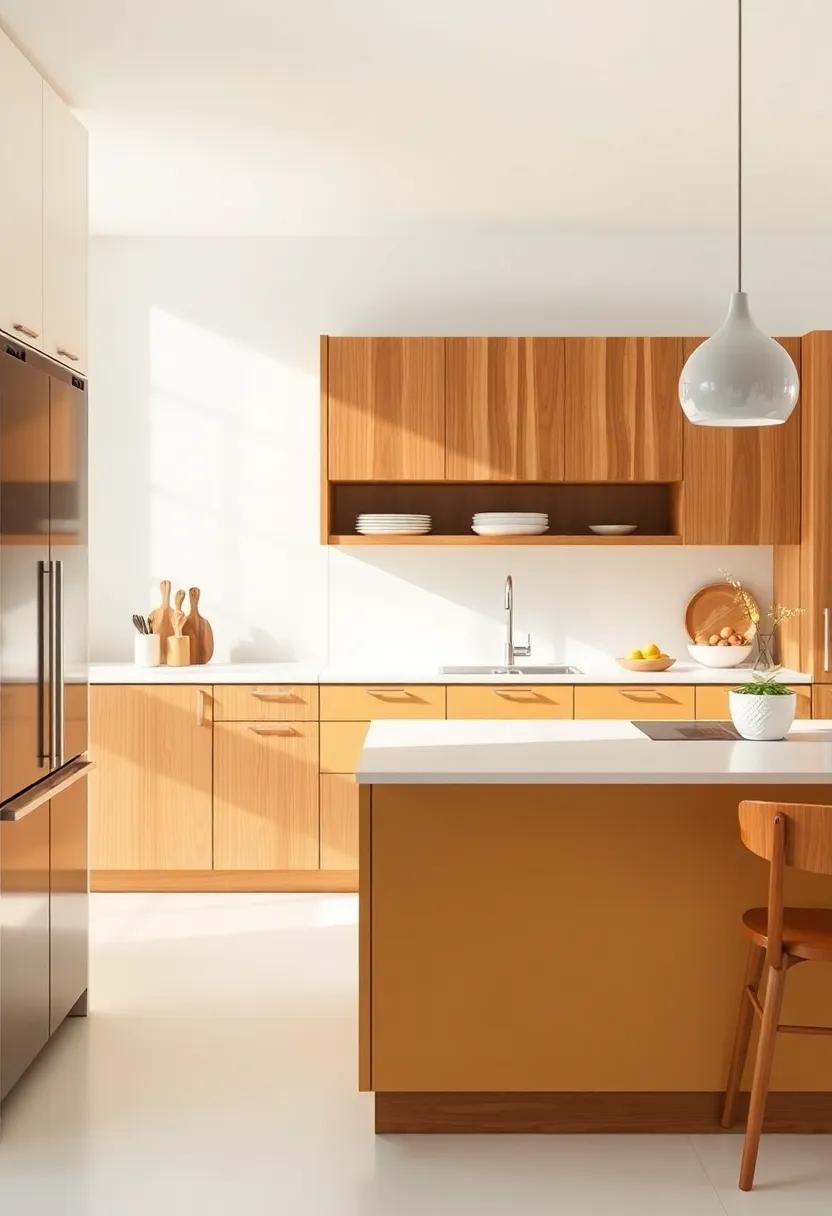
Midcentury modern kitchen design thrives on the principle of less is more, showcasing a balance between form and function. Characterized by clean lines, open spaces, and a seamless flow, these kitchens invite a sense of tranquility and association. Essential elements include natural materials, such as wood and stone, and thoughtfully selected furnishings that double as decor. By stripping away needless clutter,midcentury modern aesthetics fosters an surroundings where every item serves a purpose while contributing to the overall harmony of the space.
Key features of minimalist midcentury kitchens frequently enough involve a restrained color palette with earthy tones complemented by bold splashes of color through accents.Consider sleek cabinetry with integrated handles and high-quality finishes that maintain simplicity and elegance. When accessorizing, focus on functional tools with a sculptural quality, allowing items to serve dual roles—tools that are not only practical but also lovely. In this way, the kitchen becomes a canvas of artistry and utility, inviting creativity in both cooking and daily interaction.
Bold Colors and Geometric Patterns: A Vibrant Palette for Midcentury Spaces
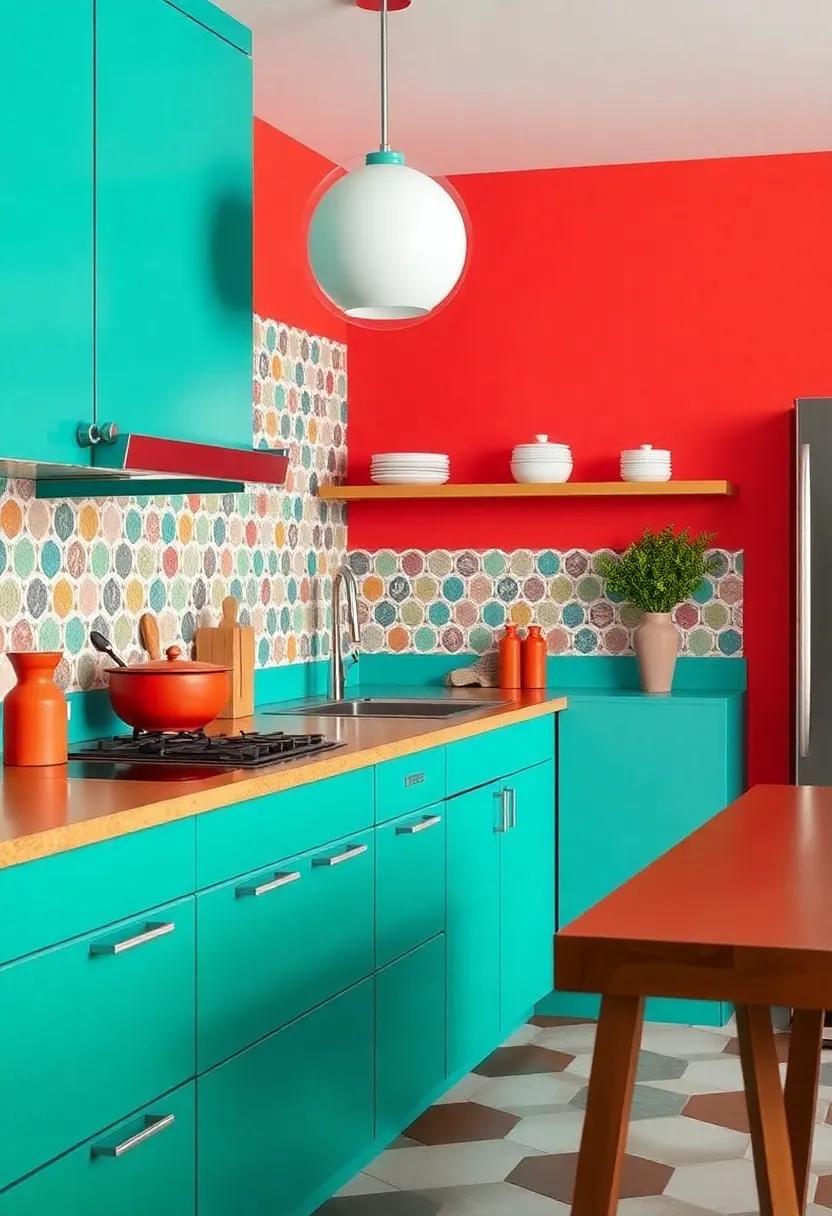
Embracing a vibrant palette is essential for capturing the essence of midcentury modern design. The striking, bold colors that characterize this era, such as deep oranges, rich greens, and shining yellows, breathe life into any kitchen. These hues can be showcased in cabinetry,backsplashes,or accessories,creating a dynamic environment that encourages creativity and expression. When combined with geometric patterns—be it through tile designs or textiles—the result is an engaging aesthetic that feels both fresh and nostalgic. Incorporating textures and contrasting elements also enhances the depth and interest of these spaces.
To fully embrace the midcentury modern vibe, consider selecting a mix of colors and patterns that evoke the period’s artistic spirit. Here are a few ideas to inspire your choices:
- Accent Walls: use a bold color like turquoise or mustard yellow as a striking backdrop.
- tile Designs: Incorporate geometric patterns, such as chevrons or hexagons, for a playful touch.
- textiles: Choose patterned curtains or rugs that feature retro-inspired motifs.
Iconic Fixtures: Selecting the right Lighting for a Timeless Kitchen Ambiance
![]()
Achieving a warm, inviting ambiance in a midcentury modern kitchen hinges largely on the right choice of lighting. Pendant lights, notably those with bold, geometric shapes, can instantly transform the area’s aesthetic while paying homage to the era’s design principles.Opt for fixtures made from materials like copper or matte black finishes, as they beautifully complement rich wood cabinetry and playful tile backsplashes.Consider elements such as:
- Size: Ensure that pendant lights are proportionate to the kitchen space, providing sufficient illumination without overwhelming the area.
- Adjustability: Choose adjustable fixtures to direct light where it’s needed most, whether over an island or dining table.
- Layering: Incorporate different lighting layers, like recessed lights and under-cabinet strips, to create depth and highlight architectural features.
Wall sconces can also add an elegant touch, particularly when placed strategically to frame windows or artwork. These fixtures breathe life into the walls while casting a soft glow that enhances the kitchen’s charm. When selecting wall sconces, be mindful of the following:
- Style: patterns and materials should reflect midcentury aesthetics; options like brass or crystal can elevate the space.
- Height: Install fixtures at eye level for maximum impact and functionality.
- Ambiance: Dimmable sconces allow for adjustable lighting, making it easy to create a cozy atmosphere during meals or gatherings.
Natural Materials: The Beauty of Wood and Stone in Midcentury Kitchen Aesthetics
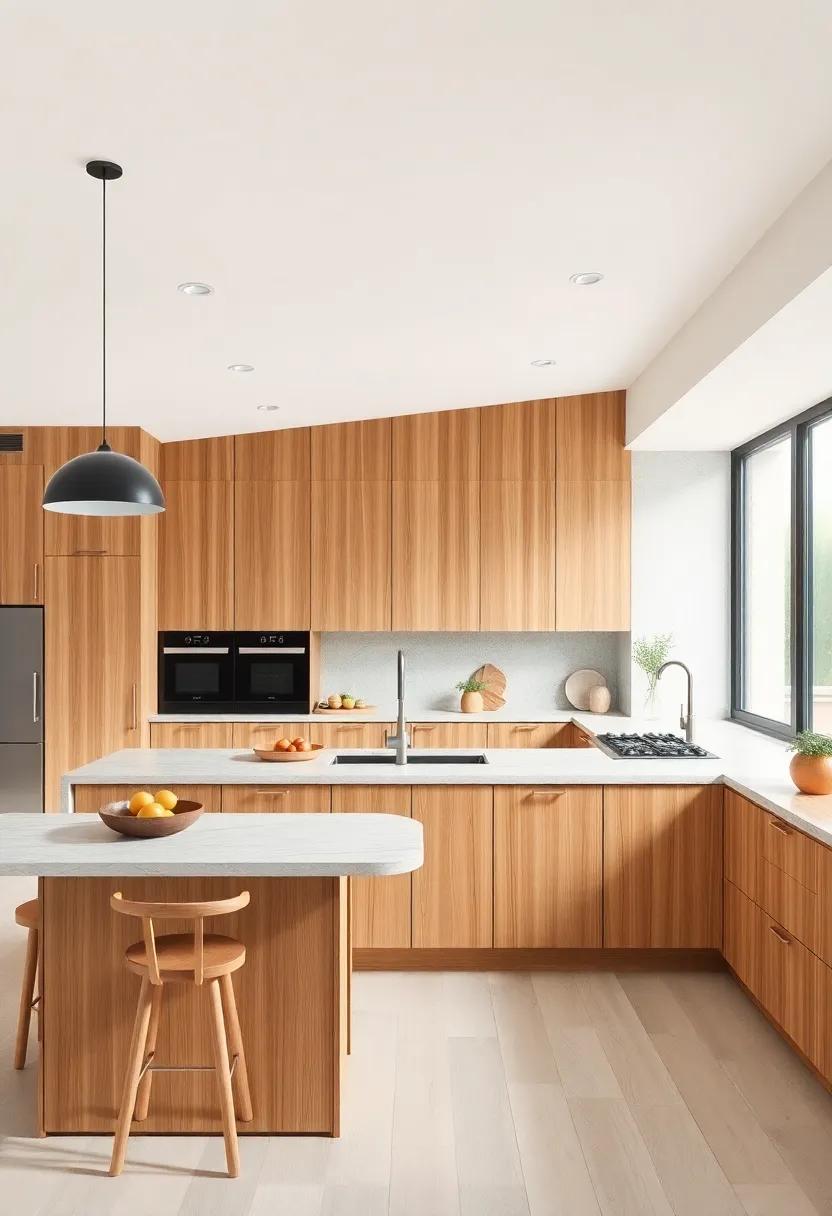
The allure of midcentury kitchens lies in their seamless integration of natural materials, particularly wood and stone, which infuse spaces with warmth and character. richly grained cabinets and countertops made from exotic woods not only serve as functional elements but also as stunning visual statements. The choice of warm tones, such as walnut or teak, enhances the overall ambiance and reflects a design ideology that celebrates craftsmanship and durability. Additionally, the textural diversity that wood offers plays a significant role in creating a layered aesthetic, where every detail contributes to the cozy yet refined environment typical of midcentury modern kitchens.
Incorporating stone into kitchen designs further elevates the organic feel, providing a timeless contrast to wooden elements. Materials like granite, marble, and soapstone can be used for countertops or backsplashes, adding a natural elegance that complements the simplicity of midcentury design. The combination of smooth stone surfaces with the rich texture of wood creates a balanced and inviting space. Furthermore, such natural materials are not only pleasing to the eye but also durable and easy to maintain, making them ideal for active kitchen environments. Whether through polished countertops or rustic stone walls,the harmonious blend of wood and stone captures the essence of midcentury modern aesthetics,celebrating the beauty of the natural world in our homes.
Open Concept Flow: Creating Space for Culinary Creativity and social Gatherings
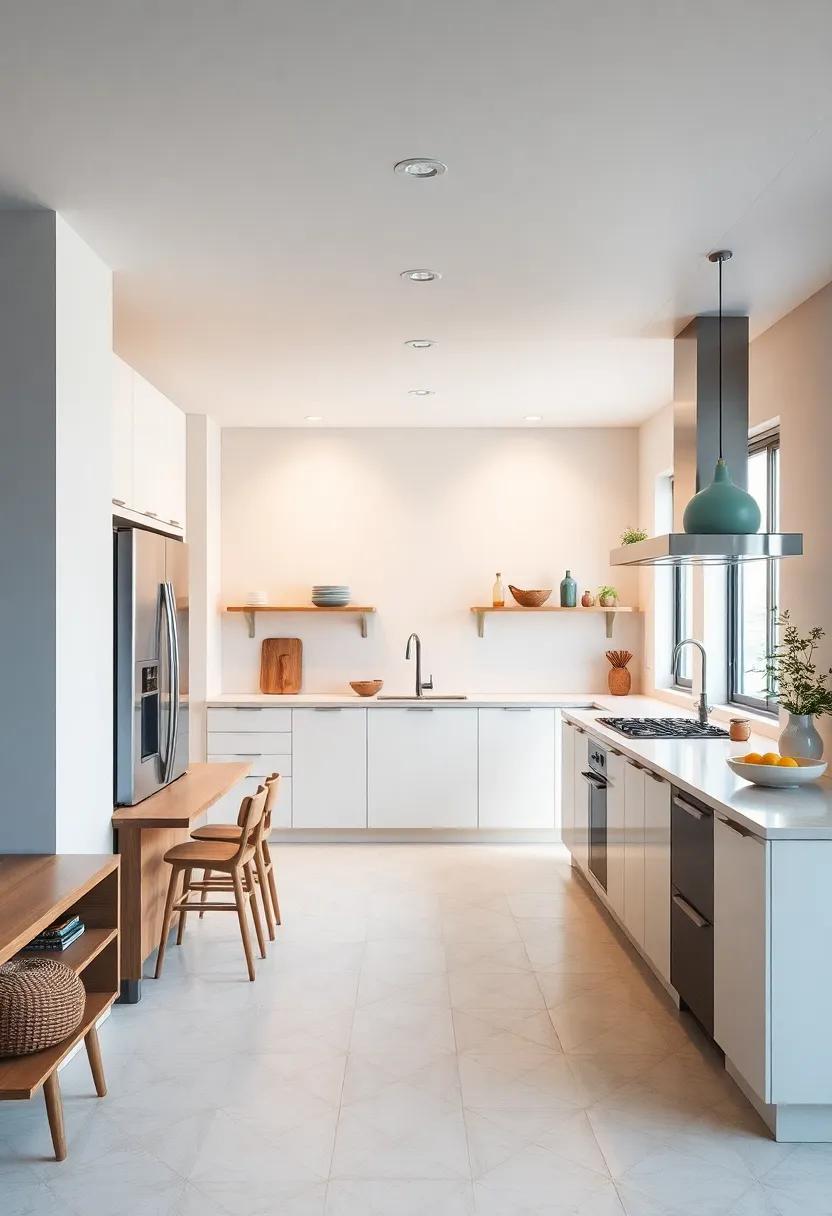
In the heart of a midcentury modern kitchen, open spaces beckon culinary aficionados and enthusiastic hosts alike. This design philosophy breaks down barriers, blending the kitchen with dining and living areas to create a seamless flow.Such a layout not only encourages conversation but also inspires creativity, allowing chefs to whip up dishes while engaging with family and friends. The minimalistic yet functional cabinetry often features clean lines and natural materials, enhancing the overall light and airy atmosphere, fostering a sense of connection among those present.
The use of strategically placed islands becomes a central gathering point, serving both practical purposes and as a social hub. here are some key elements that amplify the concept of space in these kitchens:
- Natural Light: Large windows or open spaces create brightness, which elevates mood and enhances aesthetics.
- Multi-functional Furniture: Bar stools and tables that serve dual purposes invite casual dining and relaxation.
- Seamless Transitions: Flooring that flows from the kitchen to the living area extends visual space.
Vintage Appliances: Blending Functionality with retro Style in Your Kitchen
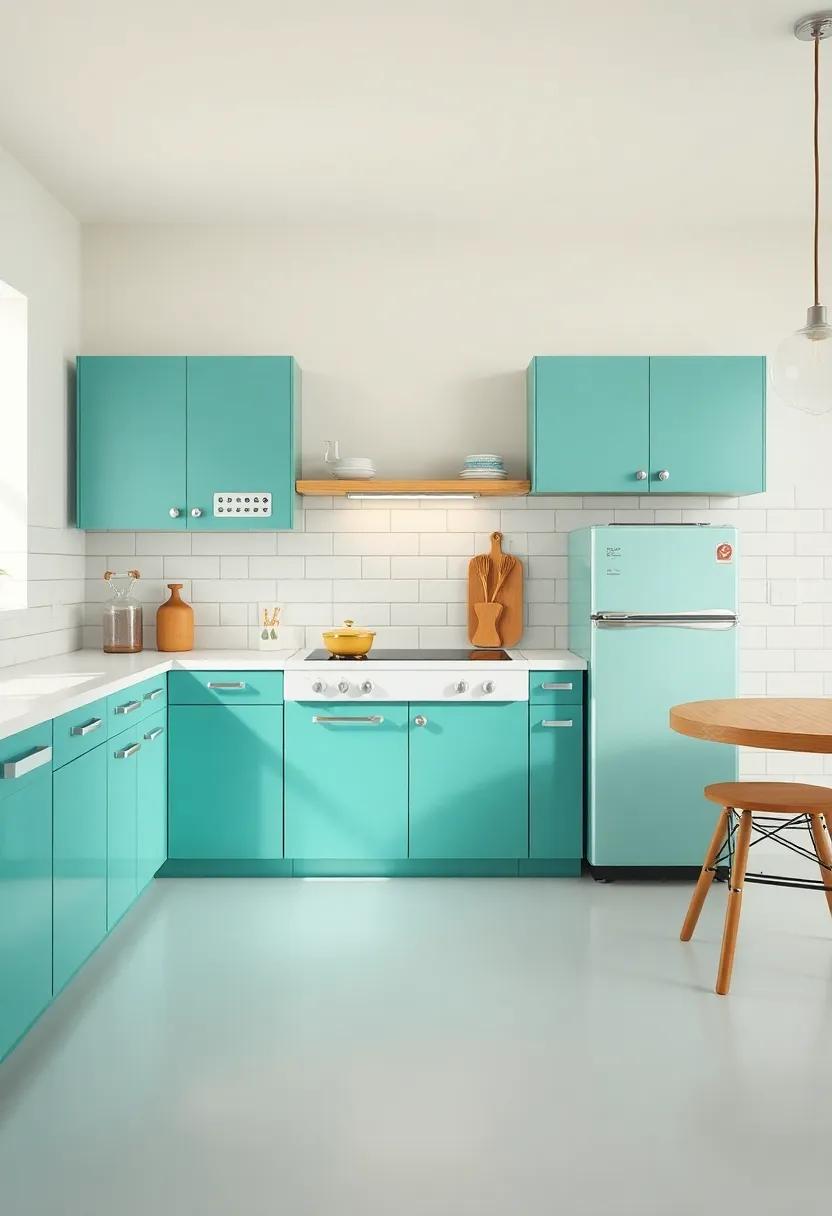
Incorporating vintage appliances into your kitchen design not only enhances the aesthetic appeal but also brings a sense of nostalgia that many find captivating. These timeless pieces, frequently enough characterized by their bold colors and unique shapes, seamlessly integrate into the midcentury modern aesthetic, offering a charming contrast to contemporary minimalism. Imagine a cherry-red retro fridge paired with soft pastel cabinetry; the result is a space that invites warmth and sparks conversation, making your kitchen the heart of the home.
When considering vintage appliances, it’s essential to evaluate both their functionality and the distinctive style they bring. Look for features that blend seamlessly with modern cooking needs, such as energy efficiency and ease of maintainance, while still showcasing that retro flair. Key elements to consider include:
- Color Palette: Bright hues or soft pastels can define the overall vibe.
- Unique Designs: from rounded edges to chrome accents, these designs can set your kitchen apart.
- Material Quality: Vintage appliances often feature durable materials that stand the test of time.
| Appliance | Feature | Style Impact |
|---|---|---|
| Retro Refrigerator | Spacious with vintage knobs | bold statement piece |
| Classic Toaster | Dual slots with chrome finish | Functional with flair |
| Vintage Mixer | High-performance with splash guard | Chef-inspired nostalgia |
Classic Cabinetry: Exploring the Signature Lines of Midcentury Kitchen Furniture
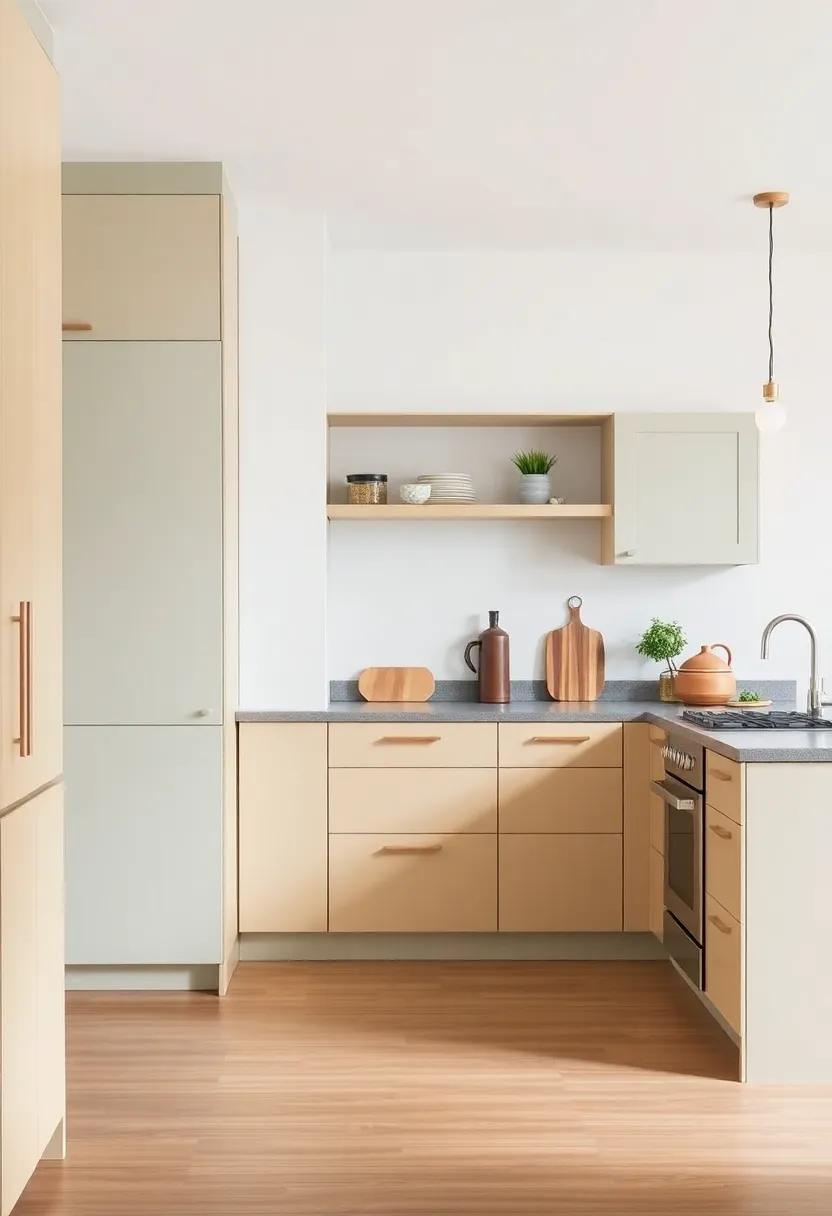
Midcentury kitchen furniture introduces a stunning blend of functionality and aesthetics, epitomizing the spirit of modern design. Signature lines from renowned designers like Charles and Ray Eames,George Nelson,and Paul McCobb have forever shaped cabinetry’s place in our homes. These pieces, characterized by their sleek lines and minimalist forms, frequently enough feature materials such as rich hardwoods and innovative laminates that speak to both quality and style. key attributes include:
- Clean silhouettes that enhance the sense of space
- Bold colors that add a pop of personality
- Functional hardware that combines beauty and utility
Cabinetry from this era also reflects a commitment to craftsmanship and sustainability – often built to endure both time and trends. As we explore the modular designs that became popular, it’s evident that these cabinets serve not just as storage solutions, but as works of art that define the kitchen’s ambiance.To emphasize their meaning, consider the table below, outlining iconic styles and their defining features:
| Style | Characteristics |
|---|---|
| scandinavian | Light woods, gentle curves, simplicity |
| American Modern | Functionality, geometric shapes, bold colors |
| california contemporary | Open spaces, indoor-outdoor flow, natural materials |
Furniture Choices: Integrating Functional Seating that Captures the Era’s Charm
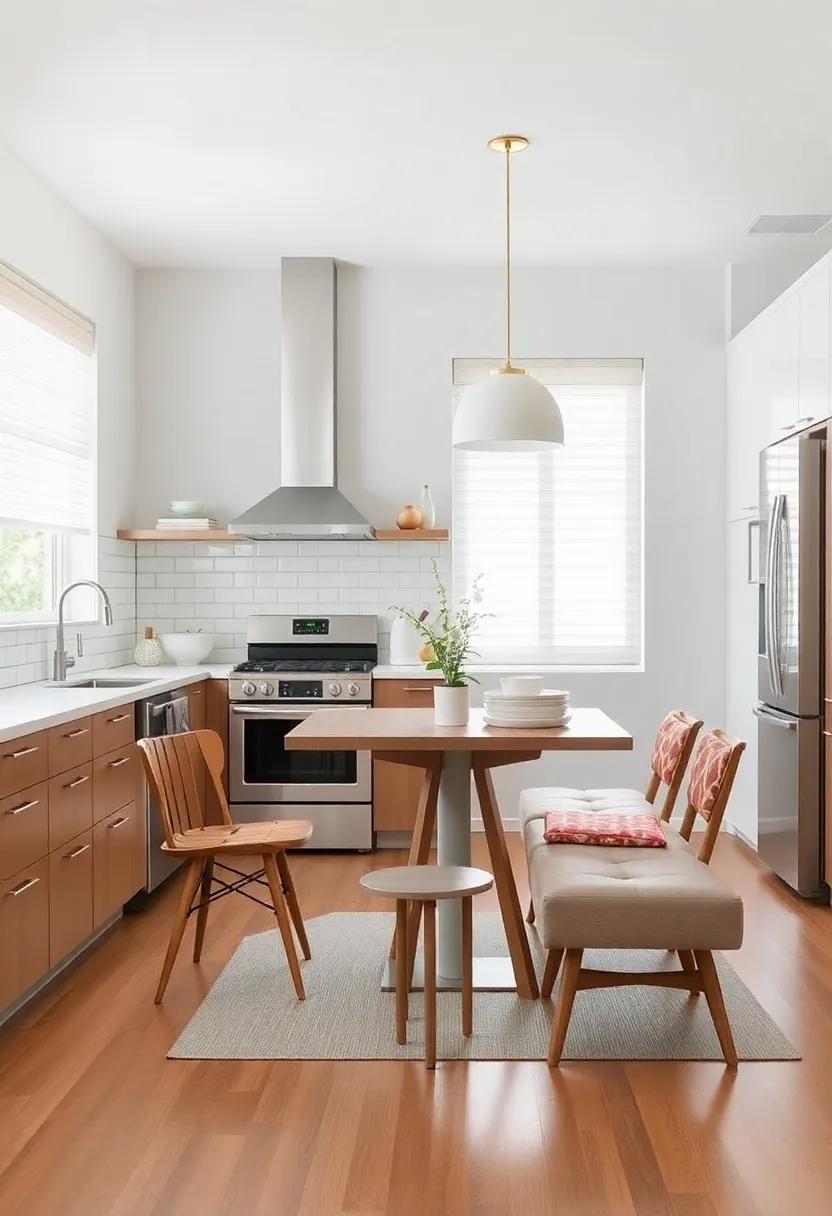
when selecting seating for a midcentury modern kitchen, it’s essential to strike a balance between aesthetic appeal and practicality. Look for pieces that not only complement the clean lines and organic forms characteristic of the era but also offer comfort and versatility. Consider options like:
- Eames molded plastic chairs – Their minimalist design and a splash of color can enhance the vibe of any kitchen.
- Bar stools with tapered legs – Perfect for kitchen islands, they provide a stylish, yet practical seating solution.
- Midcentury dining sets – Featuring elegant wooden frames and upholstered seats that invite conversation and gatherings.
Incorporating furniture pieces that echo the elegance of the midcentury era can transform a kitchen into a timeless haven. Focus on durable materials and unique textures to add depth. Consider establishing a cohesive look with a furniture combination that might include:
| Furniture Element | Material | Style Feature |
|---|---|---|
| Dining Chair | Wood + Upholstery | Curved Backrest |
| Bar Stool | Metal + Wood | Industrial Legs |
| Accent Bench | Leather + Wood | Bench Seat |
Timeless Fixtures: Balancing Form and Function in Midcentury Kitchen Details
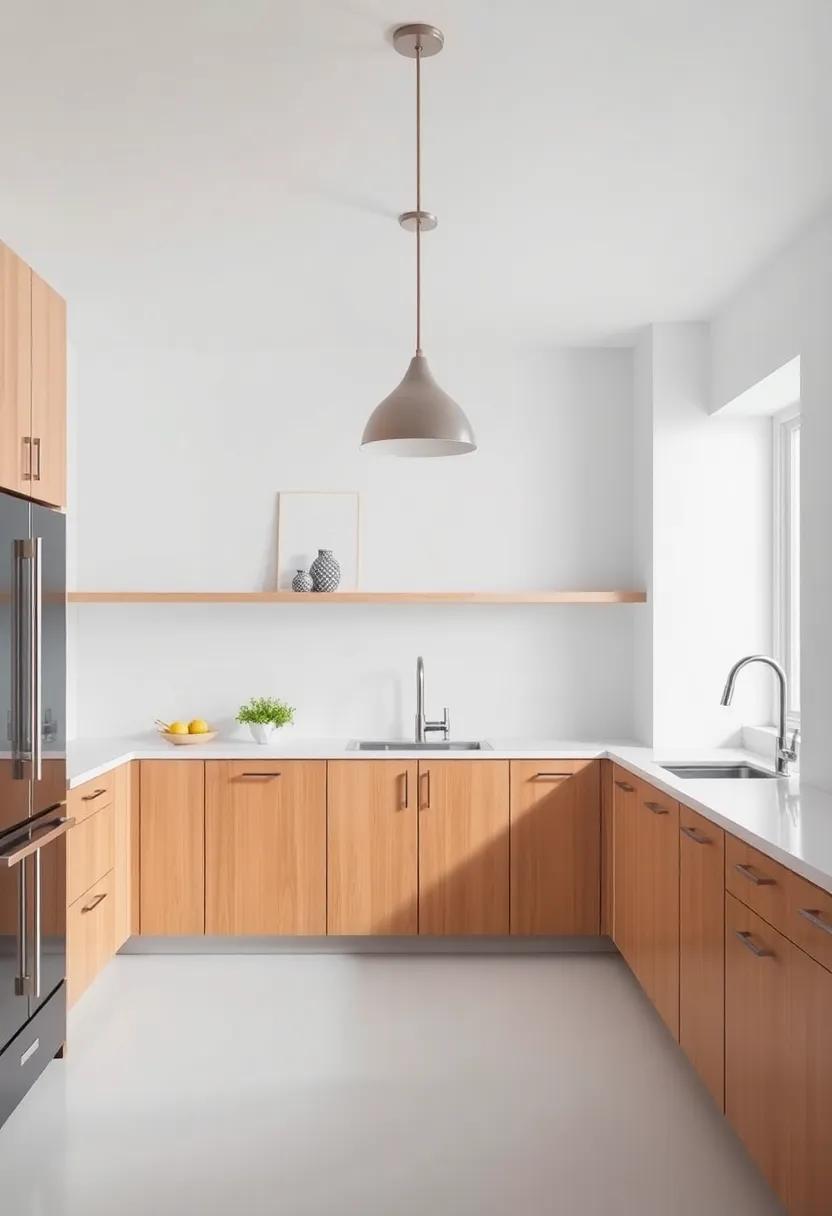
The essence of midcentury modern kitchens lies in an exquisite blend of sleek aesthetics and pragmatic design. Fixtures from this era are not merely functional but also artistic statements, embodying the philosophy of “less is more.” From bold pendant lights to minimalist faucets, each element serves a dual purpose—enhancing the visual appeal while offering optimal usability. Commonly featured materials include polished metals and natural woods, which not only bring warmth to the space but also adapt beautifully to various color palettes.The iconic two-tone cabinetry combines with open shelving to create a sense of airiness,allowing both style and accessibility in every culinary endeavor.
The charm of these kitchens is further accentuated by careful attention to detail, with fixtures that harmoniously merge with the overall design. Consider the impact of a well-placed island, which serves as a multifunctional hub for cooking, dining, and socializing. Key features of midcentury kitchen fixtures include:
- Geometric shapes: Clean lines and sharp angles that provide visual interest.
- Natural Textures: A blend of materials like wood and metal promotes a cozy yet sophisticated atmosphere.
- Earthy Color Palette: Shades of olive green, mustard yellow, and warm browns that evoke a sense of harmony with nature.
| Fixture Type | functionality | Aesthetic Quality |
|---|---|---|
| Pendant Lights | Illumination & Ambiance | Bold Design element |
| Faucets | Water Delivery | Sleek & Modern |
| Cabinet Hardware | Functionality & Access | Statement Accents |
Innovative Storage Solutions: Maximizing Space with Style in a Timeless Kitchen
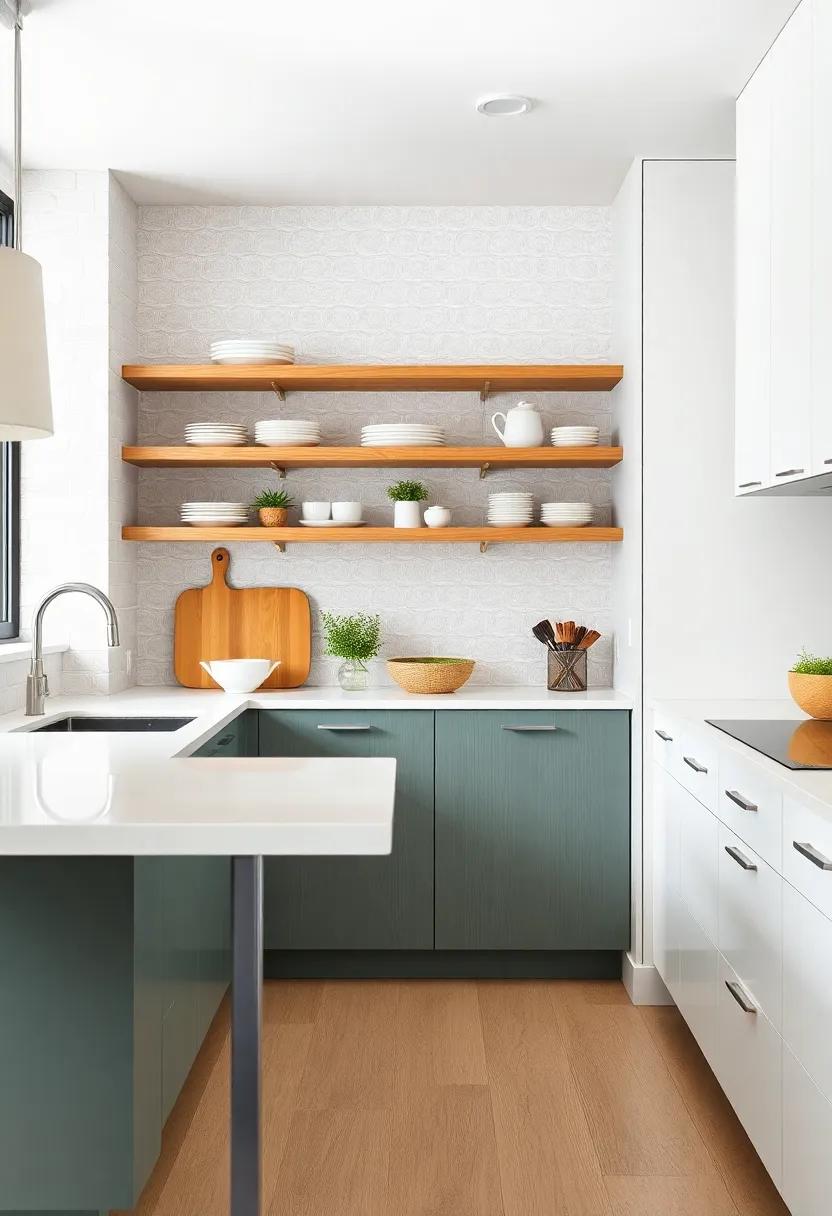
In the realm of midcentury modern design, functional elegance reigns supreme. The kitchen, frequently enough considered the heart of the home, offers myriad opportunities for innovative storage that harmonizes both beauty and practicality. Open shelves made from rich woods or sleek metals accentuate the kitchen’s aesthetic while providing easy access to frequently used items. In addition, cleverly nested islands with built-in cabinets can transform a central dining area into an efficient workspace. Homeowners are increasingly drawn to the following stylish storage solutions:
- Pull-out Spice Racks – Keeping spices organized and within reach enhances cooking efficiency and adds to a clean look.
- Appliance Garages – Discreetly store small kitchen appliances to minimize clutter while retaining functionality.
- Corner Drawers – Utilize every square inch of space by installing unique corner drawers that are perfect for pots and pans.
- Pegboards – A fashionable way to display utensils, adding visual interest and practical utility.
Furthermore, the integration of multi-functional furniture allows for sophisticated solutions that adapt to modern living. As an example, a kitchen peninsula that doubles as a dining area maximizes space without compromising style. Incorporating sliding shelves and adjustable cabinet heights can also create a tailored storage experience that caters to your unique culinary needs. Below is a simple overview of some additional advanced storage options:
| Storage Solution | description |
|---|---|
| Under-Cabinet Lighting | Illuminates your workspace while subtly showcasing decorative items. |
| Pull-out Trolley | provides accessible storage for ingredients or serveware, enhancing flexibility. |
| Vertical Dividers | Perfect for organizing baking sheets and cutting boards without becoming an eyesore. |
artistic Backdrops: The Role of Backsplashes in Enhancing Midcentury Design
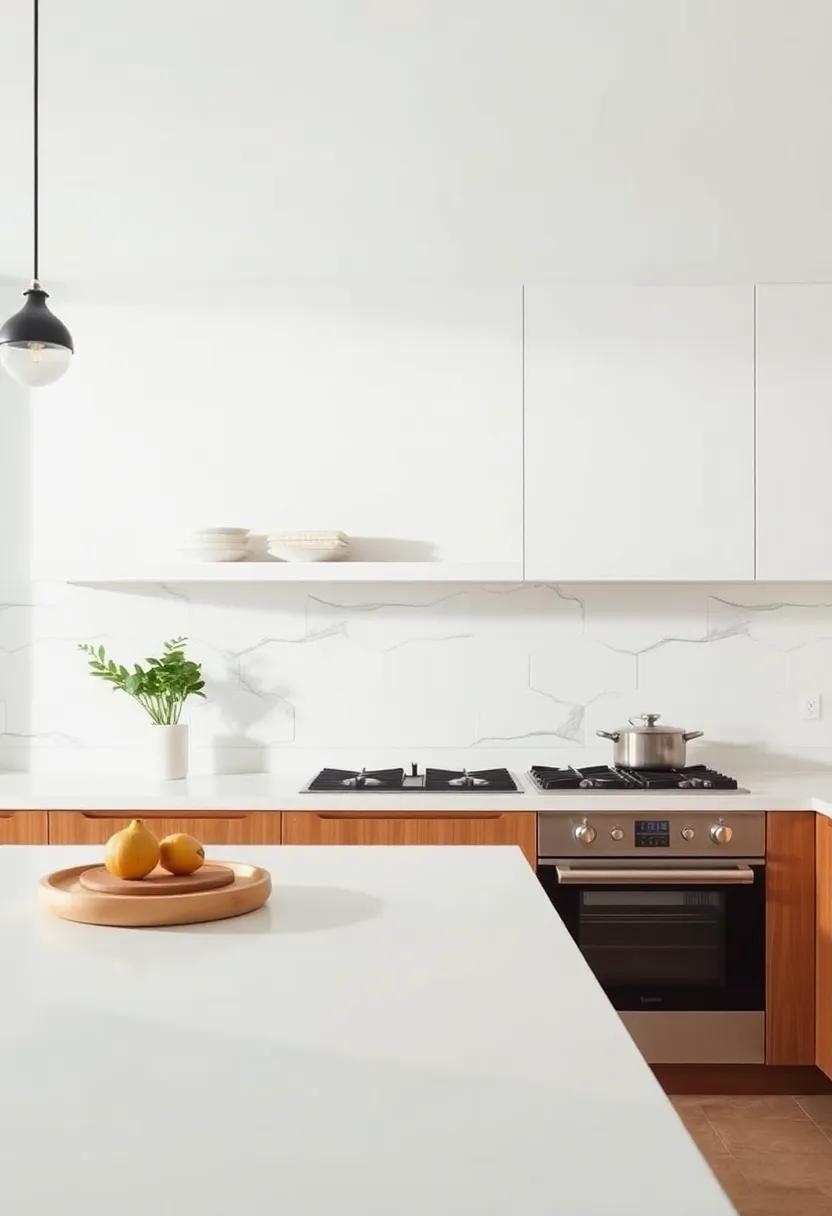
The allure of midcentury design lies not only in its clean lines and functionality but also in the stunning backdrops that create an atmosphere of timeless elegance. Backsplashes, often overlooked, serve as an artistic canvas that can transform a simple kitchen into a vibrant reflection of the era’s innovative spirit. Geometric patterns and bold colors, typical of this design period, add visual interest, while textured materials like ceramic tiles or glass mosaic exude a sense of craftsmanship. When paired with classic elements such as wooden cabinetry and chrome fixtures, these artistic backdrops elevate the overall aesthetic, uniting style and utility.
Beyond aesthetics, backsplashes play a significant role in defining the character of a space. They provide an opportunity for homeowners to express personal taste while staying true to midcentury modern principles. Consider features such as:
- Color contrasts: A bright yellow or teal backsplash can beautifully contrast with earthy wood tones.
- Textural variety: Combining smooth tiles with rough-hewn materials creates depth and visual intrigue.
- Minimalist patterns: Subtle prints can enhance the sleekness typical of midcentury design.
implementing these ideas not only showcases individual style but also pays homage to the heritage of midcentury modern architecture. These thoughtful details enhance the functionality of kitchens while serving as a focal point that sparks conversation and admiration.
Sustainable Choices: Exploring Eco-Friendly Options for a Midcentury Kitchen
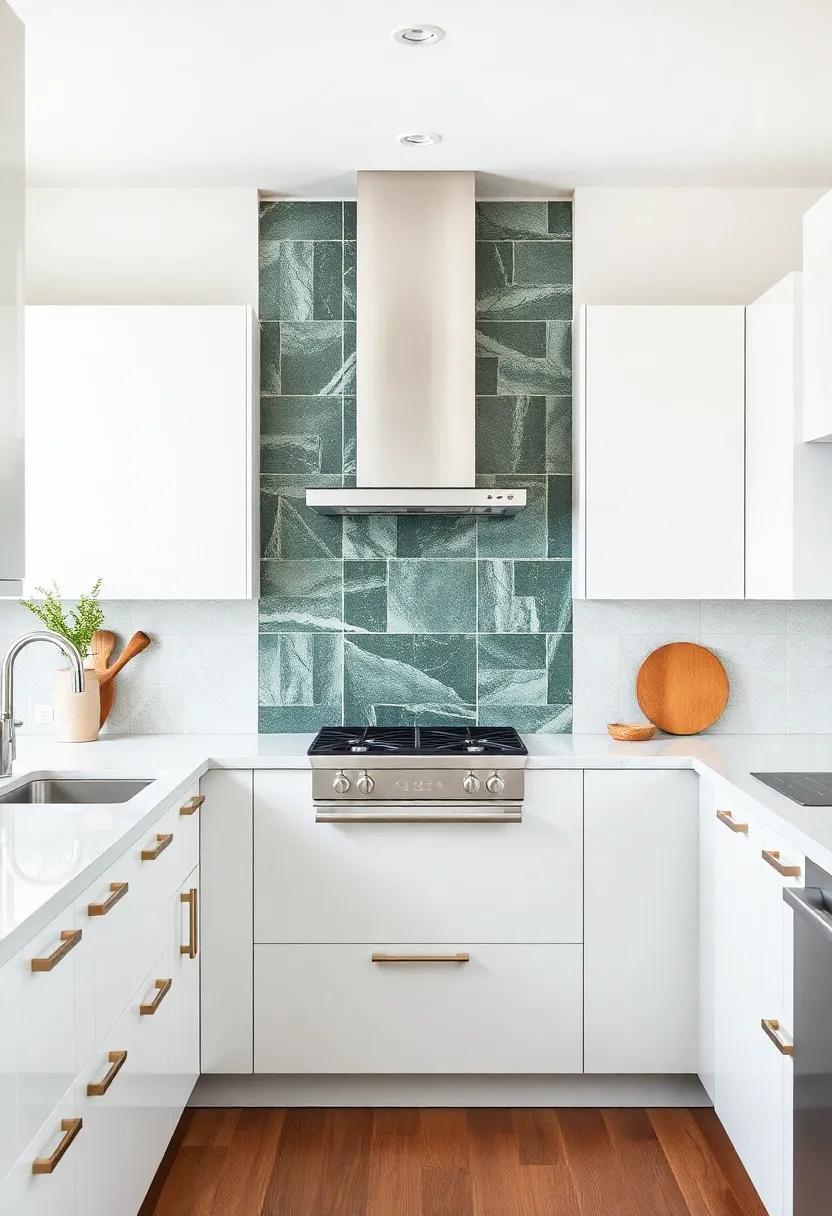
Incorporating eco-friendly materials into a midcentury kitchen not only honors the design’s aesthetic heritage but also embraces a sustainable lifestyle. Opt for bamboo cabinetry, which is easily renewable and adds a warm, inviting texture, or consider reclaimed wood, sourced from old barns or buildings. These materials carry history and character, perfectly complementing the clean lines of midcentury modern design. Adding natural stone countertops can enhance durability while maintaining an organic feel.When selecting appliances, look for energy-efficient models that minimize environmental impact without sacrificing style.
Another way to enhance sustainability is through thoughtful choice in decor and furnishings. Vintage and second-hand pieces not only reduce waste but also often feature unique designs that enhance the charm of your kitchen. Incorporating low-VOC paints and finishes can substantially improve indoor air quality while staying true to the midcentury palette of bold colors. To further emphasize a green approach, consider a herb garden or indoor plants to improve air quality and add a touch of nature. Below is a table summarizing some key sustainable options:
| material | Benefit | Style Compatibility |
|---|---|---|
| bamboo | Eco-friendly, renewable | Warm and modern |
| Reclaimed wood | History and character | Rustic and stylish |
| Energy-Efficient Appliances | Saves energy, reduces bills | Contemporary yet functional |
| Low-VOC Paints | Improves air quality | Bold colors with a twist |
| Indoor Plants | Enhances decor, purifies air | brings nature inside |
Seamless Indoor-Outdoor Living: Merging Spaces for a Tranquil Kitchen Experience
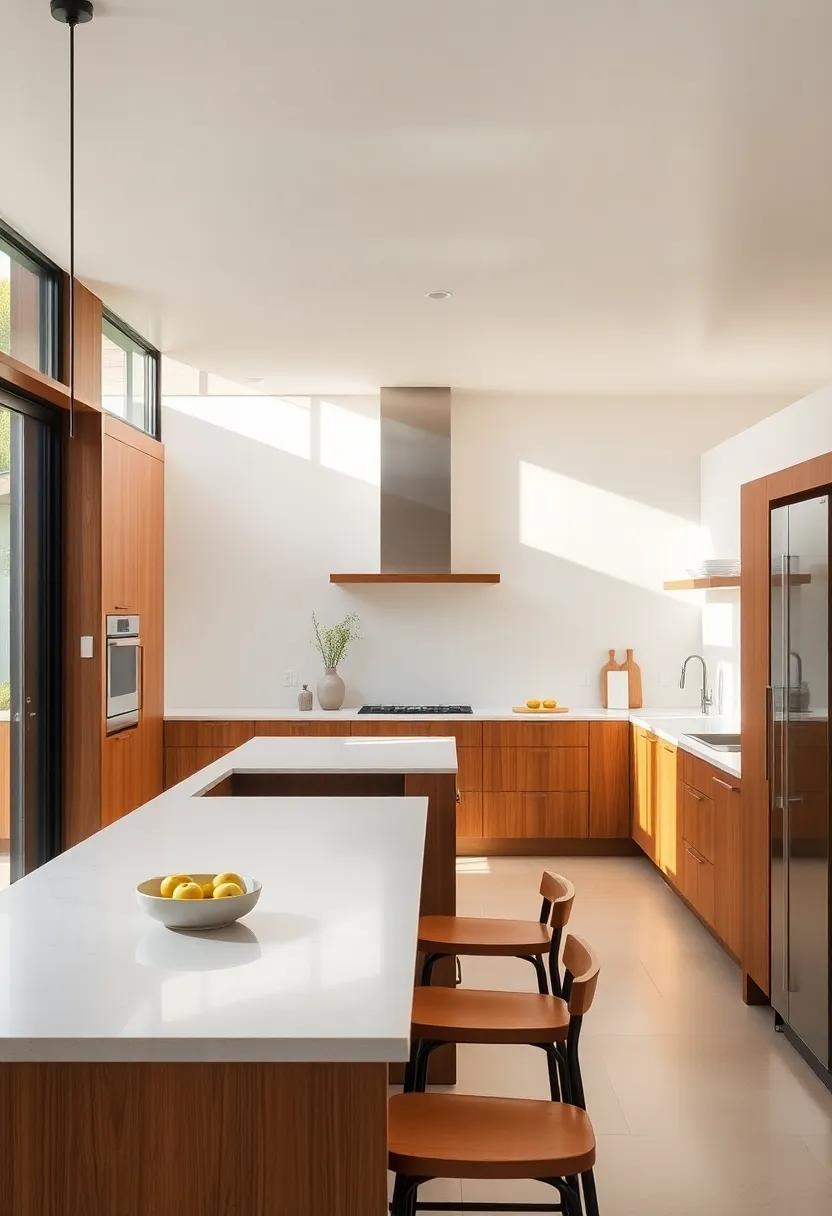
embracing the seamless transition between indoor and outdoor spaces in a midcentury modern kitchen elevates not only the aesthetic appeal but also enhances the overall culinary experience. Large, floor-to-ceiling windows and sliding glass doors create a visual connection with nature, providing breathtaking views that can soothe the soul. You can transform this space into a calming retreat by:
- Incorporating natural materials such as wood and stone, which resonate with organic surroundings.
- Utilizing a cohesive color palette that reflects the outdoors, enabling a smooth transition.
- Designing multifunctional spaces with movable furniture to adapt effortlessly to various kitchen activities.
A strategically placed outdoor dining area or patio can expand your kitchen’s functionality, making it a perfect venue for al fresco dining or entertaining guests. By integrating sleek,modern lines with soft,natural elements,midcentury kitchens not only serve as cooking spaces but also embody a lifestyle choice that celebrates connection,both with the environment and within your home. Consider these design elements:
| Element | Benefit |
|---|---|
| Large windows | Enhance natural light and nature views |
| Sliding Doors | Easy access to outdoor areas |
| Natural Materials | Create a warm, inviting ambiance |
Cultivating a Nostalgic Atmosphere: Decor that Reflects the Midcentury Spirit
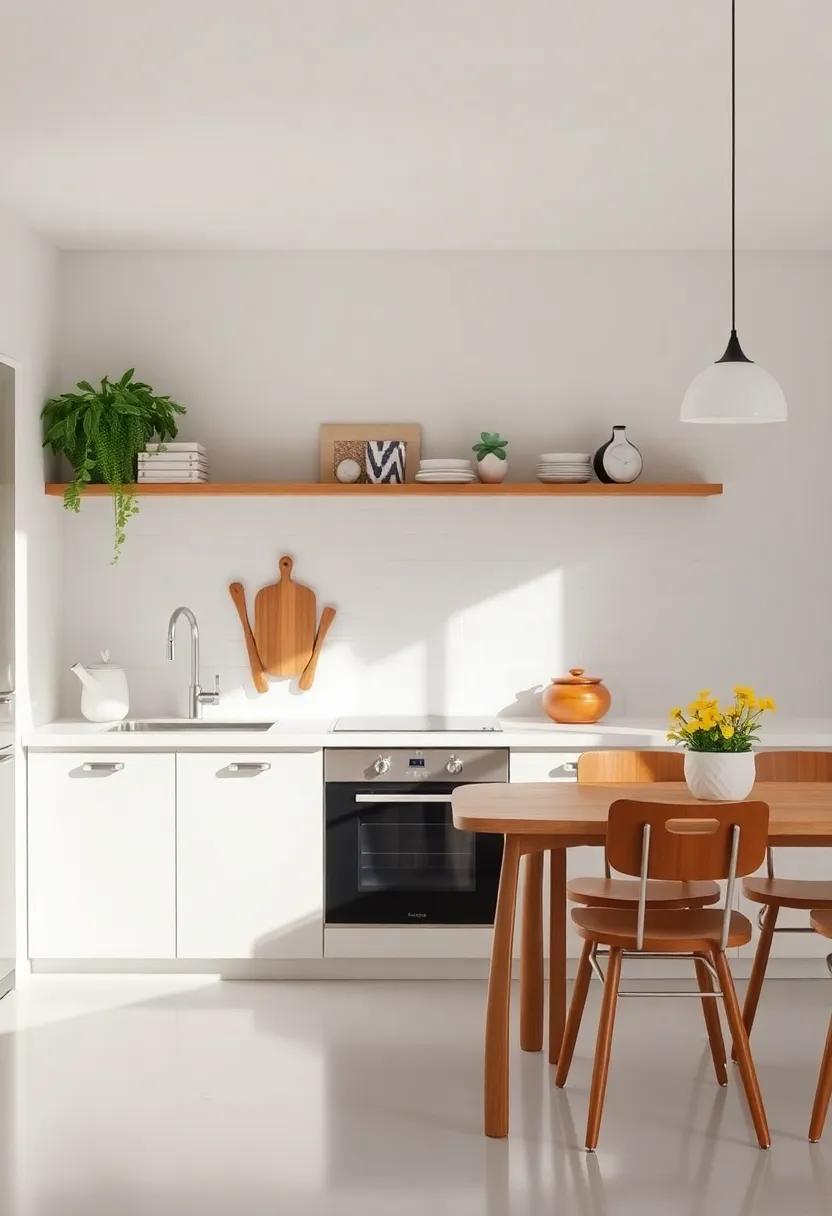
To truly evoke the spirit of the midcentury era, one must embrace decor that showcases its distinct design philosophy. Think geometric patterns and a harmonious blend of natural materials, from rich woods to vibrant fabrics. Incorporating iconic elements, such as a retro diner-style table or vintage bar stools, can effortlessly transport you back to a time when home cooking was at the forefront of social gatherings. The use of muted yet bold colors like teal,mustard yellow,and burnt orange can create an inviting ambiance that reflects the joyful essence of the midcentury aesthetic.
lighting plays a pivotal role in crafting an authentic atmosphere, so consider adding statement pendant lights or sconces with a sleek, sculptural form. Fill your kitchen space with accessories that nod to this golden age of design. Some ideas include:
- Graphic tableware with patterns that mirror the artistic prints of the time.
- Authentic kitchen appliances in shades like red or cream, reminiscent of the classic standalone fridge.
- Wall art featuring vintage ads or abstract geometric motifs.
Ultimately, the key lies in balancing functionality with nostalgic charm, creating a space that not only celebrates the past but also invites you to savor everyday moments.
Layering Textures: The Importance of Soft Fabrics and Hard Surfaces in Design
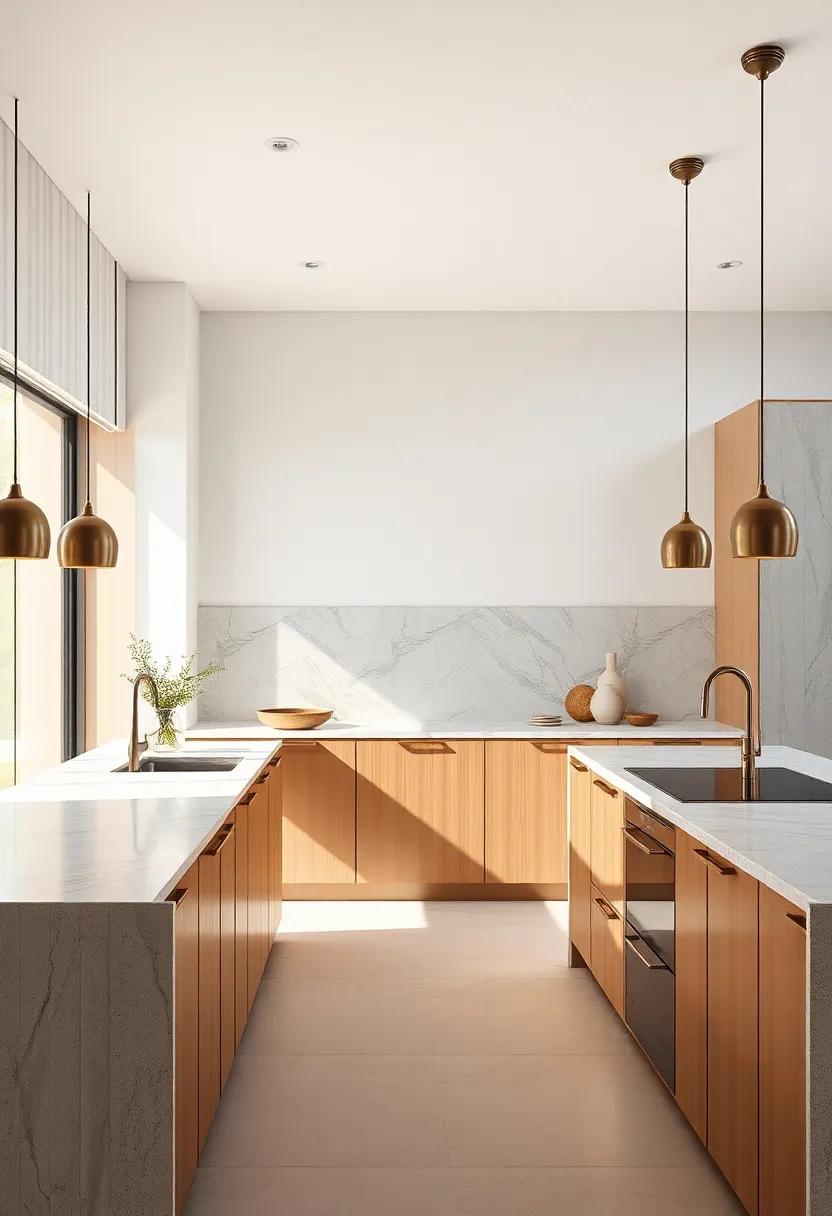
In midcentury modern kitchens, the interplay between soft fabrics and hard surfaces creates an inviting yet sophisticated atmosphere. Think of the contrast provided by sleek marble countertops paired with cozy cotton or linen window treatments. This balance not only adds depth to the design but also enhances the overall functionality without overwhelming the aesthetic. The use of upholstered barstools can introduce a subtle touch of warmth, allowing for agreeable seating that complements the clean lines of metal fixtures and cabinetry. Elements such as a plush area rug can further unify the space, offering a tactile layer that invites both guests and family to linger within the kitchen’s embrace.
Incorporating texture can transform the kitchen into a multi-dimensional canvas, where the visual appeal lies in the combination of various materials. By selecting items such as wooden cutting boards,ceramic dishes,and glass containers,you create a storyline that showcases a rich variety of textures. Consider the table below, which highlights popular choices of materials and their effects on a midcentury modern aesthetic:
| material | Effect |
|---|---|
| Wood | Brings warmth and organic beauty |
| Metal | Adds a sense of modernity and sleekness |
| Glass | Provides transparency and lightness |
| Textiles | Infuses softness and comfort |
Combining these materials in thoughtful ways helps create a balanced design that resonates with timeless elegance.One can revitalize a kitchen by layering soft touches against sturdy surfaces, ensuring that the space feels both functional and aesthetically pleasing. Thus,the harmony between hard and soft plays a crucial role in defining the essence of midcentury modern kitchens,making them not only functional spaces for culinary creativity but also warm,welcoming areas for social interaction.
Creating a Focal Point: showcasing Statement Pieces in Your Kitchen Decor
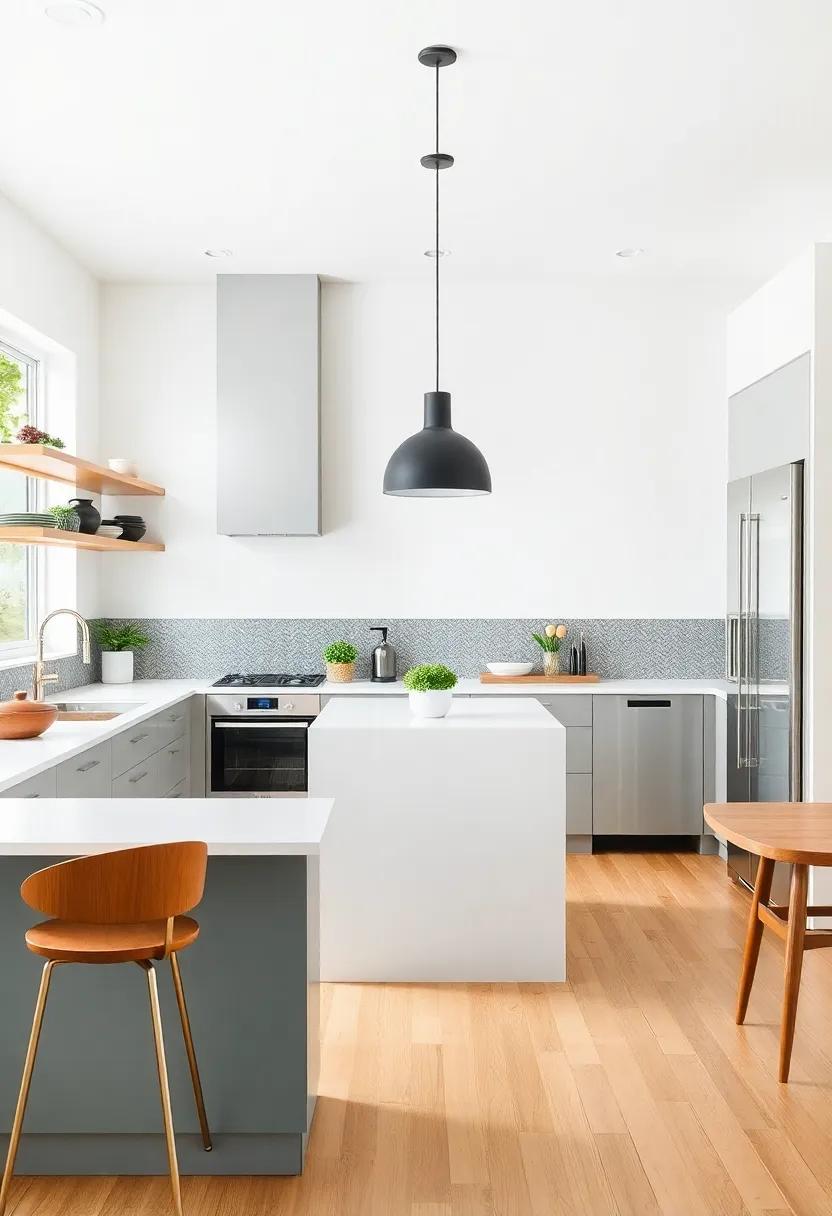
In a midcentury modern kitchen, creating a stunning focal point is essential to harmonize the space while showcasing your personal style. Statement pieces such as a vibrant backsplash, a retro dining table, or even an eye-catching pendant light can serve as captivating highlights. Consider incorporating bold color palettes, unique textures, and innovative shapes to draw attention while maintaining the clean lines characteristic of this design era. A few ideas for focal points include:
- Artistic Backsplash: A geometric tile design can add depth and interest.
- Vintage Appliances: Using iconic colors like mint green or butter yellow enhances the period feel.
- Midcentury Furniture: An elegant Saarinen table paired with modern chairs can dominate the dining area.
- Statement lighting: Unique fixtures, like a Sputnik chandelier, can dramatically alter ambiance.
Alongside strategic focal points, it’s crucial to think about arrangement and balance within the kitchen. Grouping accessories and decor around these statement pieces can create a cohesive look that invites admiration. Use an organized display of items such as cookbooks, distinctive serving ware, or curated plants to complement your main feature. The following table outlines how to beautifully balance statement pieces with complementary decor:
| Focal Point | Complementary Decor |
|---|---|
| Bold Backsplash | Neutral cookware and utensils |
| Vintage Refrigerator | Modernist wall art |
| Unique dining Table | Simple, elegant table settings |
| Stylish Lighting Fixture | Warm-toned wood accents |
Celebrating Craftsmanship: The Handcrafted Touch in Midcentury Modern Kitchens
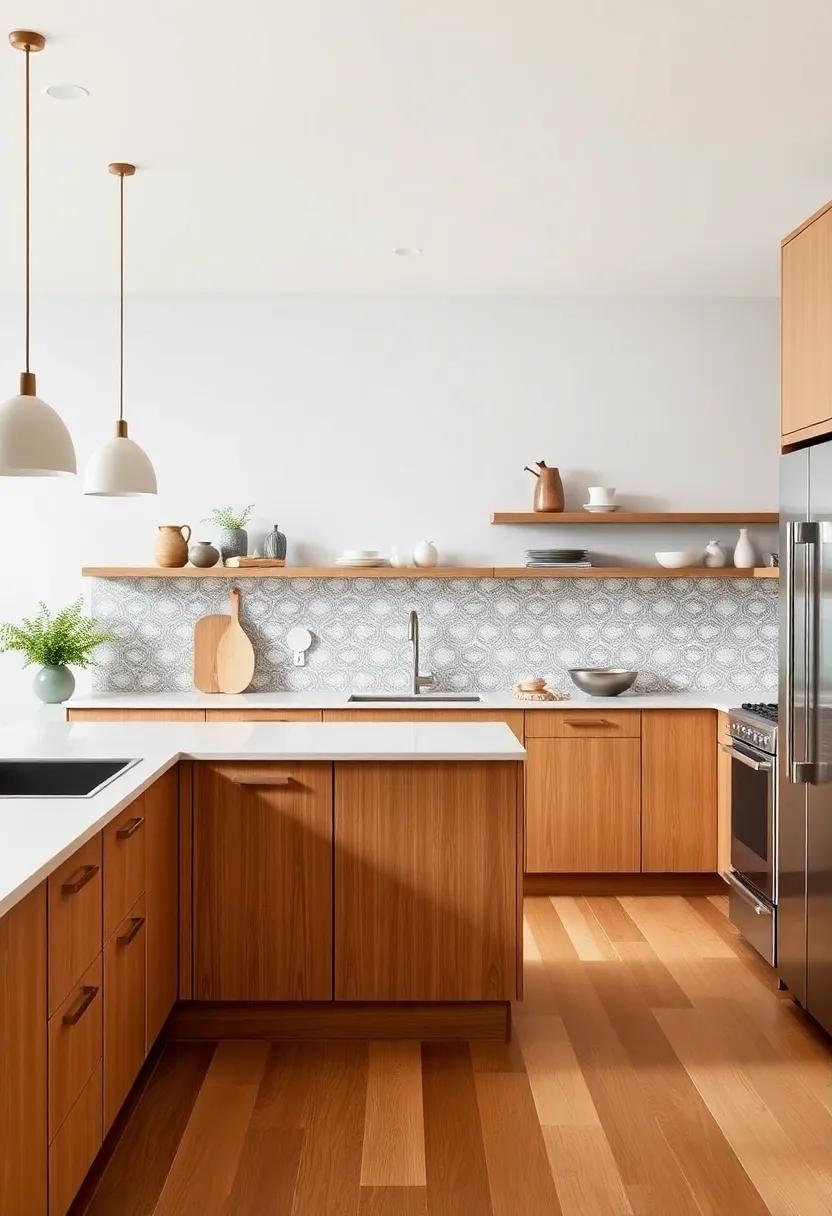
The essence of midcentury modern kitchens lies in their handcrafted elements that showcase a remarkable blend of function and artistry.Each piece, from cabinetry to countertops, reflects a commitment to quality and design that transcends time. Artisans often utilized natural materials, such as solid woods and stone, which not only serve practical purposes but also bring warmth and texture to the space. This deep appreciation for craftsmanship is evident in details like dovetail joints and hand-carved accents, providing each kitchen with a unique character that off-the-shelf solutions cannot replicate.
Incorporating these handcrafted touches results in a kitchen that tells a story; one that invites creativity and connection. Key features frequently enough include:
- Custom cabinetry designed with precision and thoughtful elements
- Handmade tiles that add a personal flair and artistic expression
- Unique hardware crafted by skilled artisans, serving as functional art
- Natural finishes that highlight the beauty of materials, preserved over time
Additionally, the mastery of handmade details goes beyond aesthetics; these kitchens promote sustainability through durable materials and the philosophy of repair over replacement. Hence, midcentury modern kitchens not only represent a design era but also embody an enduring respect for craftsmanship that continues to inspire contemporary trends.
Personalizing the Space: Infusing Modern Elegance with Personal Touches
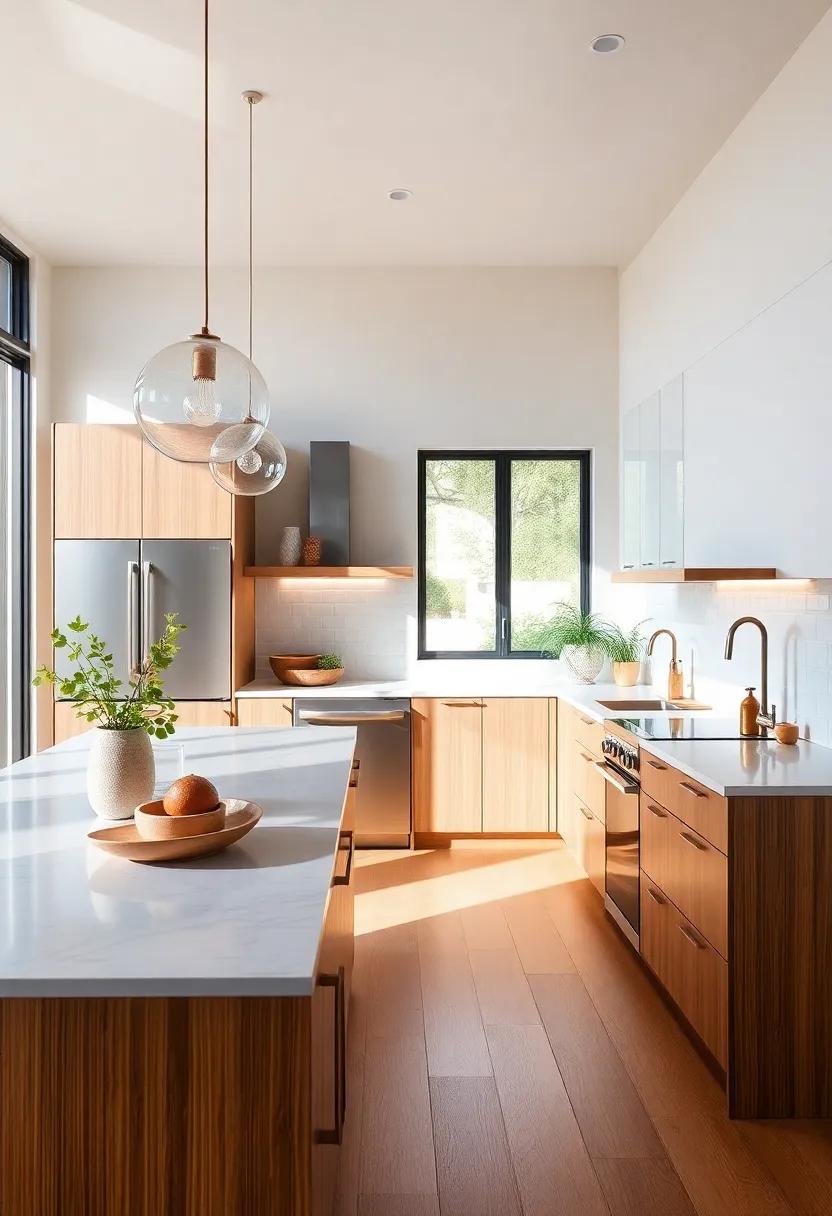
In the pursuit of modern elegance, integrating personal elements into your midcentury modern kitchen can create a beautiful harmony that resonates with your unique style. Artistic touches, family heirlooms, and custom accessories transform a standard kitchen into a personal sanctuary. Consider displaying a colorful gallery wall of vintage cookware or framed family recipes,blending nostalgia with contemporary design. Incorporating textured textiles such as handwoven dish towels or bespoke aprons can add warmth and character, inviting both functionality and aesthetics into the space.
To further enhance the ambiance, efficient storage solutions that reflect your personality can be pivotal. Use open shelving to showcase your favorite cookbooks or curated ceramic collections, adding layers of interest and color. Additionally, strategically placed plants can breathe life into the kitchen, creating a serene, organic atmosphere. Here’s a simple table of elements to consider integrating:
| Element | Purpose |
|---|---|
| Personal Artwork | Adds character and creates a sense of belonging. |
| Vintage Utensils | Bridges the past with the present, sparking conversation. |
| Custom Lighting | Enhances mood and highlights architectural features. |
| Herb Garden | Provides fresh ingredients while promoting a sense of tranquility. |
to sum up
In the dance between past and present, midcentury modern kitchens evoke a unique charm that transcends time and trend. By embracing their sleek lines, vibrant colors, and functional simplicity, we not only honor a significant design era but also enrich our contemporary living spaces with a sense of history and authenticity. As you consider the heart of your home,let the enduring appeal of midcentury modern design guide your choices,infusing your kitchen with both elegance and warmth. Whether you opt for a full renovation or small accents, remember that this style celebrates a philosophy of living that prioritizes quality, craftsmanship, and a connection to the art of everyday life. Here’s to creating a kitchen that resonates with timeless elegance, where each meal becomes a celebration and each moment a cherished memory.
As an Amazon Associate I earn from qualifying purchases.

